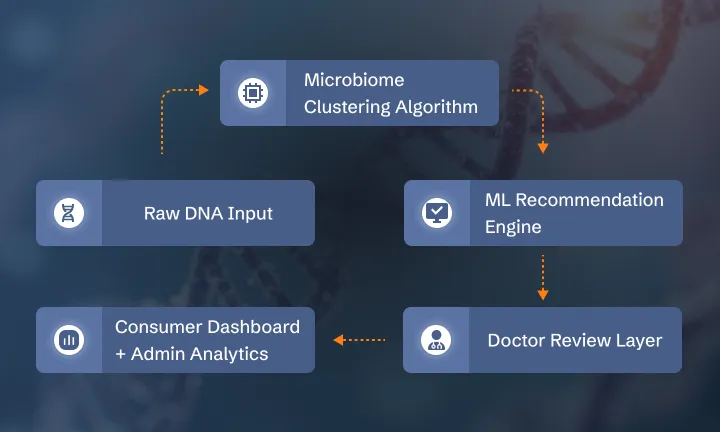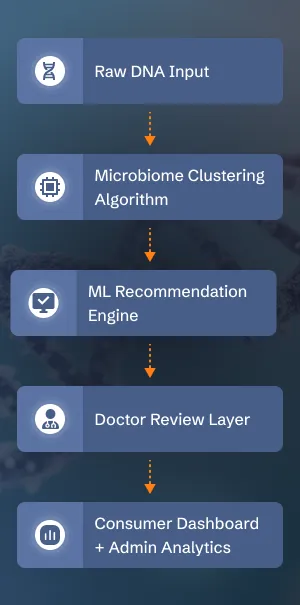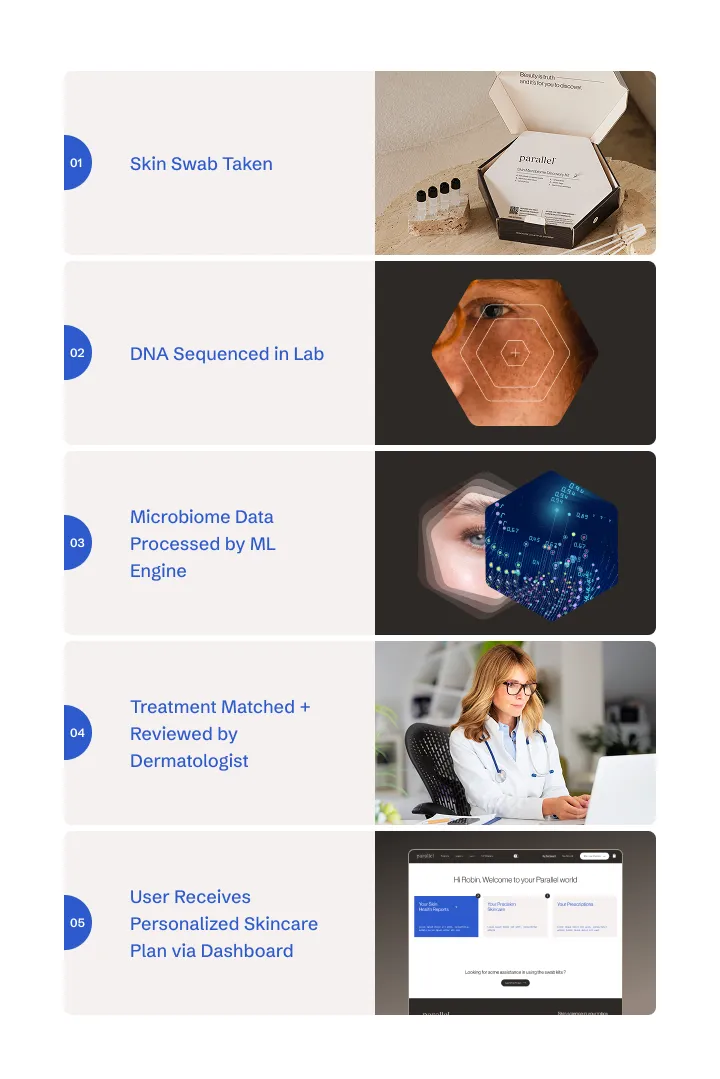Author:
The future of healthcare is being shaped by advanced technology. Imagine skincare that diagnoses and treats you using DNA-based identification of the microbes living on your skin.
From diagnosis to treatment, machine learning is opening new doors of precision and personalization in healthcare.
But turning this potential into real-world applications isn’t simple. Building systems that can manage sensitive health data, support medical decision-making, and scale reliably takes more than technical skills. It requires deep collaboration between scientific and engineering teams, and a solid, scalable infrastructure.
Unlike typical android app development projects, healthcare platforms require far more secure and compliant infrastructures, especially when dealing with DNA-based diagnostics.
Developing an app for healthcare isn’t just about code. It’s about combining biology, user experience, and machine learning, all with regulatory precision.
In this post, we’ll explore:
Healthcare generates massive volumes of data, electronic health records, lab results, genomic sequences, and real-time vitals.
Machine learning can transform that data into actionable insights by enabling:
Yet despite its promise, many organizations fall short at the execution stage.
Machine learning is already proving its value in key healthcare domains:
| Use Case | Description |
| Medical Imaging | Analyze scans to detect tumors or anomalies faster than radiologists |
| Drug Discovery | Predict molecular interactions and prioritize drug candidates |
| Predictive Analytics | Identify high-risk patients for disease or readmission |
| Virtual Assistants | Chatbots for triage or post-op monitoring |
| Personalized Treatment | Recommend therapies based on DNA or biomarkers |
At the intersection of science and skin lies one of healthcare’s newest frontiers: DNA-driven, microbiome-based skincare. That’s exactly the path Parallelhealth took.
Rather than searching endlessly for the best app developers for startups, Parallelhealth partnered with Ignite Solutions, a team trusted for building scalable, ML-powered healthcare systems.
Many app development companies promise results. Few can handle the complexity of DNA-based personalization. That’s why finding professional app developers with scientific experience was key.
We don’t just use any app-building software; our engineers built a custom ML engine that matched skin profiles to treatments with clinical-grade precision.
Let’s learn more about the project: Parallel Health, a US-based biotech startup, had a big idea:
“Let’s build a consumer platform where a simple skin swab reveals microbiome insights and recommends personalized skincare.”
Their scientific team could:
But they needed a system that could:
That’s when they partnered with Ignite Solutions.


Machine learning in healthcare is about more than algorithms. It requires:
ParallelHealth needed to align several critical components:
Without the right tech partner, this complexity would have stalled progress.
Parallelhealth had the science, a vision, and a rough prototype. Ignite helped them make it real.
The skin health dashboard shows the journey from:
This system was co-designed by Parallel Health’s scientists and Ignite’s product team. Together, we built the digital foundation to:
What seems like a simple status bar is the front end of a complex ML pipeline.


| Component | Purpose |
| Skin Microbiome Classifier | Clusters DNA sequences into skin profiles |
| Treatment Matching Engine | Links profiles to phage-based product recommendations |
| Doctor Portal + Audit Trail | Provides secure access, oversight, and edit history |
| Lab Data Integration | Automates sequencing uploads and ID matching |
| Patient Dashboard | Shows results in user-friendly language |
| Admin Layer | Tracks treatment efficacy and usage trends |
Challenge 1: Complex Scientific Inputs
DNA sequencing data and microbial clusters are not user-friendly.
Solution: We built a translation layer to convert them into plain-English insights (e.g., “You have an overgrowth of C. acnes bacteria, which may cause acne.”)
Solution: We created a hybrid workflow: ML suggests; doctors finalize.
Parallel Health’s platform is just the beginning. Other emerging ML health applications include:
Ignite is already helping other healthtech startups bring these innovations to life.
Machine learning holds the power to transform diagnosis, treatment, and patient engagement, but only if the supporting technology is built to scale and compliance
At Ignite Solutions, we specialize in:
Parallel Health now has:
Whether you’re building a skincare platform or exploring new ML use cases, you need more than an app development agency; you need a partner who understands the future of digital health.
Hiring someone to make an app is easy. Building a secure, intelligent, and scalable system is not. That’s where Ignite stands apart.
Have an app idea you want to bring to life? Whether it’s a startup project or an enterprise solution, we’re here to make it happen.
From Android app development to full-scale mobile app software, we build custom, scalable platforms powered by the latest AI and machine learning technologies.
Let’s talk and turn your idea into an intelligent, impactful product, fast.
Machine learning in healthcare means using smart computer programs to understand medical data and help doctors make better decisions. It can look at things like DNA, lab tests, or patient records to suggest treatments or spot problems early.
AI in healthcare helps with a lot of things, like reading medical images, spotting diseases early, finding new drugs, and even recommending personalized treatments. It’s already changing how doctors care for patients and how apps like Parallelhealth’s skincare platform work.
AI is a big term that covers all smart technologies that “think” like humans. Machine learning is a part of AI that learns from data to make predictions. In healthcare, machine learning powers tools that help with diagnosis, personalized care, and health monitoring.
Building an app for healthcare is a lot more complex than regular Android app development. It needs to follow strict rules to protect health data (like HIPAA), work with sensitive medical info, and use advanced tech like machine learning. It’s not just about building an app, it’s about building a safe, smart system.
Yes, but it’s important to find app developers for hire who understand both tech and healthcare. At Ignite Solutions, we’ve worked with startups like Parallelhealth to build platforms that combine science, AI, and a great user experience.
The cost of developing an app for healthcare depends on the features, data privacy needs, and whether you’re adding things like machine learning. Because healthcare apps deal with real health info, they usually cost more than regular apps, but they also deliver way more value.
Machine learning can look at your DNA and skin microbiome to figure out what’s going on with your skin. Then it can suggest the best treatments just for you. That’s what we did with Parallel Health, turning lab science into a simple skincare platform powered by AI.
Most software developers for hire can build apps. But at Ignite, we build full systems for healthtech, from secure data pipelines to AI-powered features. We understand both the tech and the science, which is why companies trust us to bring their healthcare ideas to life.